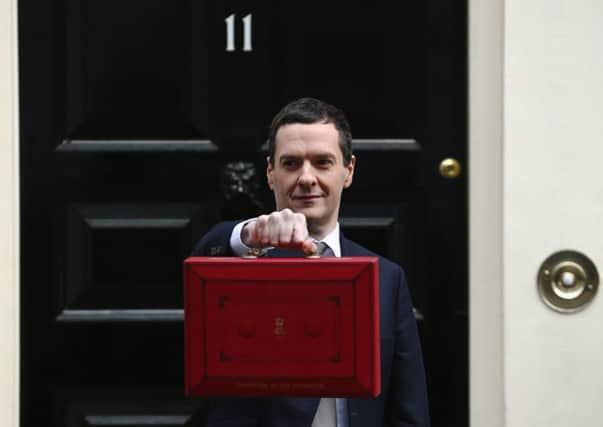Leader: George Osborne put party before country


His soundbites were pithy and polished. And the jokes against Labour leader Ed Miliband – about brotherly love, pink vans and a multiplicity of kitchens – were both effective and genuinely funny.
But there are three rather more important criteria on which the Budget should be judged.
Advertisement
Hide AdAdvertisement
Hide AdFirst, did it improve the Tories’ chances of victory on 7 May?
Second, did it do enough to rescue the North Sea oil industry from the worst effects of the crisis threatened by the oil price collapse?
And third, did it improve the more general prospects for recovery in the British economy?
On the first criterion, Mr Osborne was keen to underline a central message of the Tories’ election campaign – the idea that only the Conservatives can be trusted to make the sensible decisions necessary to put the economy back on track.
This was why a good proportion of the windfall that was at the Chancellor’s disposal yesterday – courtesy of a fall in inflation brought about by the lower oil price – was prudently put aside to reduce the deficit.
And yet enough was held back to pay for modest giveaways that press some important political buttons for the Conservatives’ target voters.
All taxpayers will benefit from the rise in the personal allowance, but pensioners, savers, small business owners and aspirational homebuyers all found something to their liking in the red box yesterday.
Will it work? At this point it is hard to say. Mr Miliband makes an unlikely Ronald Reagan, but the Labour leader is trying to ape the Gipper’s famous question to voters in the 1980 presidential election: “Are you better off than you were four years ago?”
Advertisement
Hide AdAdvertisement
Hide AdIn Reagan’s case, the American people actually were better off – statistically speaking – than they were at the start of Jimmy Carter’s presidency. But they didn’t have the feel-good factor, and Mr Reagan rode that anxiety all the way to the White House.
Mr Osborne used the Budget to try to engender a feel-good factor about the economy, embellished by some selective statistics about disposable income.
But despite his claims of a UK-wide recovery it is questionable if the average British voter is feeling a warm and self-satisfied glow, especially if they are surrounded by the wreckage of damaged frontline public services that once made a significant contribution to their well-being.
Still, enough voters may feel good enough to want to reward the Tories in May.
On the second criterion, North Sea oil, Mr Osborne is on much firmer territory.
Industry experts including Sir Ian Wood were yesterday relieved that the Treasury had heeded their warnings about the scale of potential job losses through oil companies disinvesting or choosing not to invest.
Sir Ian estimated last night that Mr Osborne’s oil-related tax changes could cut the potential lob losses in the North Sea from 80,000 to fewer than 10,000.
This is fantastic news for Scotland. The crisis in the North Sea threatened an industrial cataclysm that would have made Ravenscraig look like the closing of a corner shop.
Advertisement
Hide AdAdvertisement
Hide AdThe Chancellor did not hesitate yesterday to make this a constitutional issue. The pooling and sharing available within the UK made this tax cut affordable in a way that would simply have not been the case in an independent Scotland.
But Mr Osborne was not doing this simply out of the goodness of his heart or his abiding love for the Union. There was self-interest here too – more investment now in the North Sea ensures that the black gold keeps delivering for the Treasury in decades to come, and helps ensure the industry infrastructure is in place to allow for the fullest possible extraction of the oil still under the sea.
On the third criterion, whether the Budget will help bring Britain to full economic recovery, the verdict on Mr Osborne is much less kind.
His £6 billion room for manoeuvre did not come about because of his genius or his economic acuity. It was the accidental consequence of low inflation caused by low fuel prices. It was a lucky break that allowed the Chancellor to produce a pre-election Budget that could be presented as both prudent and generous.
What Mr Osborne did not do was use the billions unexpectedly at his disposal to generate the extra growth Britain so badly needs.
These billions were put to political use. With interest rates at a historic low, the money used to reduce the deficit could have been better used investing in infrastructure and public services.
Should we be surprised a Chancellor puts politics before economic sense in a pre-election Budget? But there is a difference between doing the right thing by your party and doing the right thing for your country.
FOLLOW US
SCOTSMAN TABLET AND MOBILE APPS